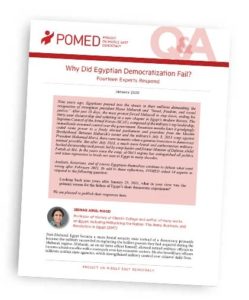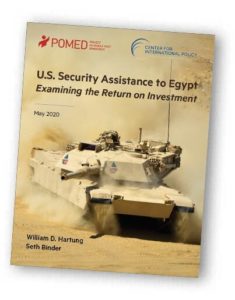The military-backed dictatorship of President Abdel Fattah al-Sisi is the most repressive in Egypt’s modern history, a Congressional committee heard yesterday. Despite al-Sisi’s claim that his iron grip is necessary to combat terrorism, “the regime’s ‘security’ measures are more often about stifling dissent, imposing control, and entrenching its power than about protecting citizens,” Amy Hawthorne, Deputy Director for Research at the Project on Middle East Democracy (POMED), said in testimony to the U.S. House of Representatives Committee on Foreign Affairs Subcommittee on the Middle East, North Africa, and International Terrorism.
 While Egyptians sank into ever-greater poverty over the past five years, Sisi has poured resources into vanity mega-projects such as building a new administrative capital in the desert 30 miles east of Cairo at an estimated cost of $58 billion, said Carnegie Middle East Director Michele Dunne (below). Not only did Egypt not need a new capital, but the site makes it inaccessible to most citizens as well as extremely problematic from a water consumption point of view. The city is being built by a military company with significant Chinese investment. As of spring 2019, the Egyptian general in charge of the project said that some $9 billion had already been spent on the city’s infrastructure, she told the hearing on “Egypt: Trends in Politics, Economics, and Human Rights.”
While Egyptians sank into ever-greater poverty over the past five years, Sisi has poured resources into vanity mega-projects such as building a new administrative capital in the desert 30 miles east of Cairo at an estimated cost of $58 billion, said Carnegie Middle East Director Michele Dunne (below). Not only did Egypt not need a new capital, but the site makes it inaccessible to most citizens as well as extremely problematic from a water consumption point of view. The city is being built by a military company with significant Chinese investment. As of spring 2019, the Egyptian general in charge of the project said that some $9 billion had already been spent on the city’s infrastructure, she told the hearing on “Egypt: Trends in Politics, Economics, and Human Rights.”
There are two steps that I recommend the United States take, National Endowment for Democracy (NED) board member Dunne told the committee:
- Reorient U.S. assistance to Egypt away from wasteful, unneeded weapons purchases and towards the critical needs of the Egyptian people. Congress should reduce Foreign Military Financing significantly from the current level of $1.3 billion and instead support civilian needs, for example, aiding a critical revolution in water usage and agriculture. Congress should continue to authorize funds bolstering human development through higher education.
- Engage with the IMF to support firm conditionality for any further lending to Egypt. Future loans should be conditioned on reforms that roll back military privileges in the economy to allow private companies the competitive conditions needed to grow and generate employment for the ever-expanding labor force. Leaders in Congress should urge administration officials to support such conditions as well as firm transparency and anti-corruption measures for future IMF loans, as recommended by Egyptian civil society organizations.
 Tamara Cofman Wittes, Senior Fellow in Foreign Policy at Brookings’ Center for Middle East Policy, said she had never seen the relationship as unbalanced and ineffective for American interests. “Over the last decade and especially in the current administration, American policy toward Egypt has moved from a comprehensive mutual partnership into one almost exclusively defined by our military assistance and our military-to-military relationship,” she said.
Tamara Cofman Wittes, Senior Fellow in Foreign Policy at Brookings’ Center for Middle East Policy, said she had never seen the relationship as unbalanced and ineffective for American interests. “Over the last decade and especially in the current administration, American policy toward Egypt has moved from a comprehensive mutual partnership into one almost exclusively defined by our military assistance and our military-to-military relationship,” she said.
Consider the trend in U.S. assistance to Egypt over the last three decades. In Fiscal Year 1990, the ratio of American military assistance to economic assistance provided to Egypt was just over 1-to-1. In Fiscal Year 2018, the ratio of military to economic aid was well over 4-to-1, she observed, calling for a reset of US-Egyptian relations.
 “The United States has important security interests in Egypt, but we cannot look away from the repression and human rights abuses,” argued Hawthorne. “Indeed, we are implicated in them through our financial and diplomatic support. Not only is the situation in Egypt morally abhorrent, it also has directly harmed American citizens.”
“The United States has important security interests in Egypt, but we cannot look away from the repression and human rights abuses,” argued Hawthorne. “Indeed, we are implicated in them through our financial and diplomatic support. Not only is the situation in Egypt morally abhorrent, it also has directly harmed American citizens.”
She urged Congress to set clear red lines with regard to Egypt’s human rights transgressions. “At the same time,” she said, “we should do whatever we can to support those Egyptians who continue to bravely and peacefully struggle for human rights, democratic values, and dignity.”
Hawthorne testified alongside Dunne, Wittes and Samuel Tadros of the Hudson Institute.
My written testimony + video for US House of Rep hearing on #Egypt: Trends in Politics, Economics, and Human Rights https://t.co/DHWqggWqwm via @MicheleDDunne
— Michele Dunne (@MicheleDDunne) September 10, 2020







